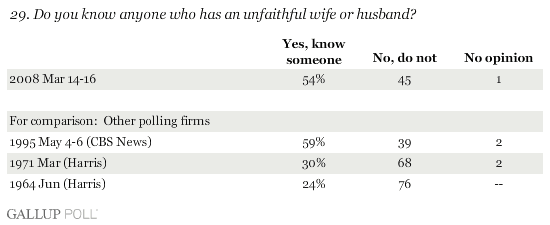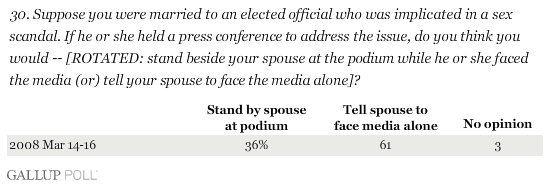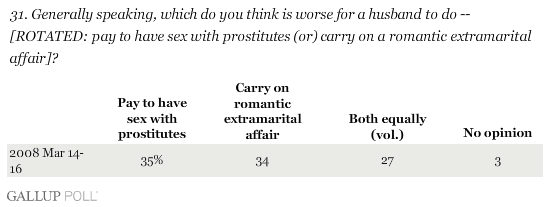PRINCETON, NJ -- Only about one in three Americans say they would forgive their spouse for marital infidelity, including just 10% who say they would definitely forgive him or her.
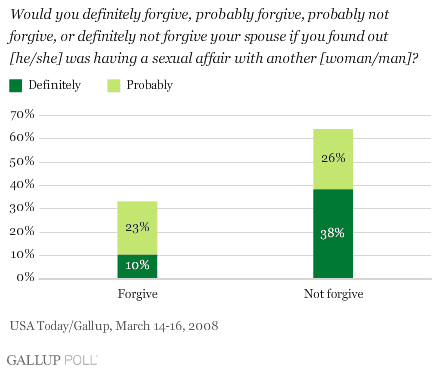
In recent weeks, the list of prominent politicians who have admitted having sexual relations outside their marriages has grown, with revelations about former New York Gov. Eliot Spitzer, current New York Gov. David Paterson, and Detroit Mayor Kwame Kilpatrick coming to light. Unfaithfulness is certainly not confined to the political world -- 54% of Americans say they know someone who has an unfaithful spouse, according to the March 14-16 USA Today/Gallup poll.
The poll also finds -- based on responses to several different questions -- that just under two-thirds of Americans would not be willing to forgive their spouse for an extramarital affair. Specifically:
- As shown above, 64% of Americans say they would not forgive their spouse for having an extramarital affair, including 38% who say they would definitely not do so.
- Sixty-two percent say they would leave their spouse and get a divorce if they found out their spouse was having an affair; 31% would not.
- Hypothetically, only 36% say they would publicly stand by their spouse at the podium if that spouse were an elected official who had to face the media to answer questions about an affair, as the former New York and New Jersey first ladies have done when their husbands' affairs were brought to light. Sixty-one percent of Americans would tell their elected-official spouse to face the media alone.
On all but the latter count, Americans who are currently married appear to be somewhat more willing to forgive an unfaithful spouse than are those not currently married, particularly when it comes to the decision to divorce.
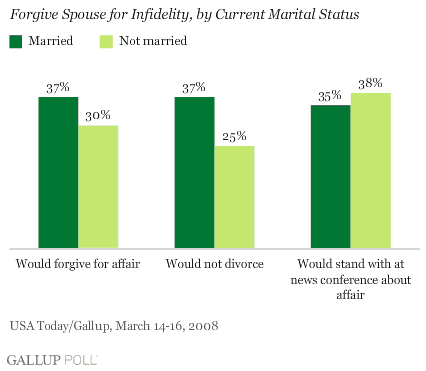
There are not meaningful differences by gender on these three forgiveness questions.
Is One Type of Marital Infidelity Worse Than Another?
While both the current and the previous New York governor admitted to marital infidelity, the details of the two cases differ. Former Gov. Spitzer had sex with prostitutes, and in the end was forced out of office because he reportedly broke other laws in order to carry on those trysts. On the day he was inaugurated to replace Spitzer, Gov. Paterson admitted having extramarital affairs with several women he knew.
The poll sought to assess whether the American public thinks one type of infidelity is worse than another. In general, the verdict is a split decision -- 35% say it is worse for a husband to pay to have sex with prostitutes and 34% say it is worse for a husband to carry on a romantic extramarital affair. Twenty-seven percent volunteer that both are equally bad.
Men and women differ in their views as to which is worse -- women tend to believe sex with prostitutes is a greater betrayal, while men say a romantic extramarital affair is.
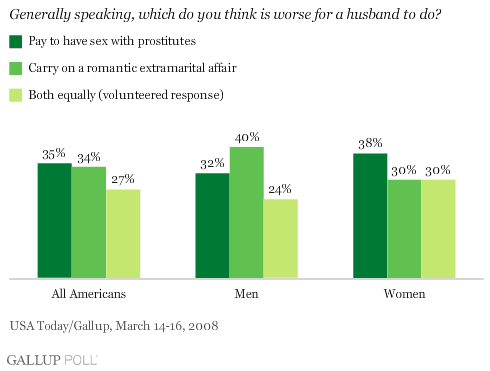
Married and unmarried respondents show minor, and not statistically meaningful, differences on this question.
Survey Methods
Results are based on telephone interviews with 1,025 national adults, aged 18 and older, conducted March 14-16, 2008. For results based on the total sample of national adults, one can say with 95% confidence that the maximum margin of sampling error is ±3 percentage points.
For results based on the sample of 557 respondents who are currently married, the maximum margin of sampling error is ±5 percentage points.
For results based on the sample of 444 respondents who are currently married, the maximum margin of sampling error is ±5 percentage points.
For results based on the sample of 505 men, the maximum margin of sampling error is ±5 percentage points.
For results based on the sample of 520 women, the maximum margin of sampling error is ±5 percentage points.
Interviews are conducted with respondents on land-line telephones (for respondents with a land-line telephone) and cellular phones (for respondents who are cell-phone only).
In addition to sampling error, question wording and practical difficulties in conducting surveys can introduce error or bias into the findings of public opinion polls.


